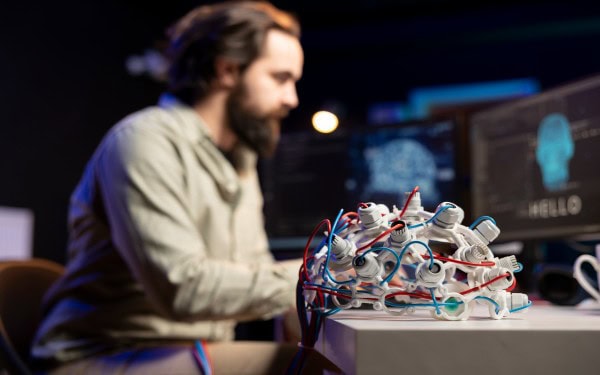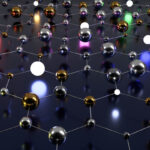Dr. Christian Beste and his dedicated research team have made remarkable progress in unravelling the complexities of ADHD, Tourette Syndrome, and other neuropsychiatric disorders, providing new insights and paving the way for innovative interventions.
This comprehensive article delves into the groundbreaking research findings of Christian Beste and his colleagues, highlighting their significant contributions to the understanding of the neurophysiological mechanisms underlying ADHD, Tourette Syndrome, and other neuropsychiatric disorders. The potential clinical implications of these discoveries are explored, emphasising the far-reaching impact of their work on the field of cognitive neuroscience and the development of targeted interventions. The article also discusses the future directions of neuropsychiatric research, inspired by Dr. Beste’s pioneering work.
Dr. Christian Beste and his research team have made remarkable strides in recent years, revolutionising our understanding of neuropsychiatric disorders, particularly ADHD and Tourette Syndrome. Through their innovative approaches and cutting-edge research, they have uncovered novel insights into the intricate neurophysiological processes that contribute to these conditions, laying the foundation for the development of more precise diagnostic tools and targeted therapeutic interventions. Their work has not only advanced the field of cognitive neuroscience but has also opened up new avenues for future research and clinical applications.
Illuminating the Neurophysiological Underpinnings of ADHD
Attention Deficit Hyperactivity Disorder (ADHD) is a neurodevelopmental disorder that affects millions of individuals worldwide, characterised by persistent difficulties with inattention, hyperactivity, and impulsivity. Dr. Christian Beste’s research has been at the forefront of efforts to elucidate the neurophysiological mechanisms that underlie the manifestation of ADHD symptoms. By leveraging advanced neuroimaging techniques and electrophysiological measures, such as EEG, his team has identified critical alterations in brain function and connectivity patterns associated with ADHD.
One of the most significant contributions of Dr. Beste’s research is the identification of the pivotal role played by the prefrontal cortex in the pathophysiology of ADHD. His studies have consistently shown that individuals with ADHD exhibit reduced activation in this region during tasks that require cognitive control, such as:
- Response inhibition
- Attention allocation
- Working memory
- Decision-making
Moreover, his work has revealed that the functional connectivity between the prefrontal cortex and other key brain areas, such as the basal ganglia, is disrupted in ADHD, leading to impairments in the regulation of behaviour and emotions. These findings have provided a more comprehensive understanding of the neural basis of ADHD and have opened up new avenues for the development of targeted interventions.
Translating Research into Clinical Practice: Implications for ADHD Diagnosis and Treatment
The groundbreaking findings from Dr. Christian Beste’s research have significant implications for the diagnosis and treatment of ADHD. By pinpointing the specific neurophysiological markers associated with the disorder, his work has opened up new avenues for the development of more objective and reliable diagnostic tools. This, in turn, has the potential to improve the accuracy and timeliness of ADHD diagnosis, enabling individuals to receive appropriate support and interventions earlier in their lives.
Furthermore, his research has provided valuable insights that inform the creation of targeted interventions aimed at enhancing cognitive control and improving functional outcomes in individuals with ADHD. For example, his work has highlighted the potential of neurofeedback training as an effective complementary treatment for ADHD. By teaching individuals to modulate their brain activity through real-time feedback, neurofeedback has the potential to strengthen the neural networks involved in cognitive control, such as the prefrontal cortex, leading to improvements in symptoms and overall functioning.
Dr. Beste’s research has also shed light on the potential of other non-invasive brain stimulation techniques, such as transcranial direct current stimulation (tDCS), in modulating the activity of the prefrontal cortex and enhancing cognitive control in individuals with ADHD. These findings have opened up new possibilities for the development of innovative therapeutic approaches that target the specific neurophysiological mechanisms underlying ADHD.
Unravelling the Enigma of Tourette Syndrome: Cognitive Control and Tic Generation
Tourette Syndrome is a complex neuropsychiatric disorder characterised by the presence of motor and vocal tics, which are involuntary, repetitive movements or vocalisations. Dr. Christian Beste’s research has made significant strides in unravelling the intricate neurophysiological underpinnings of Tourette Syndrome, particularly in relation to cognitive control and action selection.
His studies have revealed that individuals with Tourette Syndrome exhibit alterations in the delicate balance between excitatory and inhibitory processes in the brain, which may contribute to the generation of tics. Specifically, his work has shown that the motor cortex in individuals with Tourette Syndrome is hyperexcitable, resulting in a reduced threshold for the initiation of movements. Concurrently, he has found that the inhibitory control mechanisms, orchestrated by the prefrontal cortex, are impaired in Tourette Syndrome, making it challenging for individuals to suppress unwanted movements or vocalisations.
Dr. Beste’s research has also highlighted the role of the basal ganglia in the pathophysiology of Tourette Syndrome. His studies have shown that the functional connectivity between the basal ganglia and the prefrontal cortex is disrupted in individuals with Tourette Syndrome, leading to difficulties in the integration of cognitive control and motor processes. These findings have provided a more comprehensive understanding of the complex neural circuitry underlying Tourette Syndrome and have paved the way for the development of targeted interventions.
Paving the Way for Innovative Therapeutic Approaches in Tourette Syndrome
Dr. Christian Beste’s research has provided a more comprehensive understanding of the complex interplay between motor and cognitive control systems in Tourette Syndrome. His findings have laid the groundwork for the development of novel therapeutic approaches that target both the motor and cognitive aspects of the disorder.
For instance, his work has highlighted the potential efficacy of interventions that aim to enhance cognitive control, such as cognitive-behavioural therapy or neurofeedback, in reducing tic severity and improving overall functioning in individuals with Tourette Syndrome. Additionally, his research has explored the potential of non-invasive brain stimulation techniques, such as transcranial magnetic stimulation (TMS), in modulating the excitability of the motor cortex and restoring the balance between excitatory and inhibitory processes in the brain.
Moreover, Dr. Beste’s research has provided valuable insights into the potential of pharmacological interventions that target the specific neurophysiological mechanisms underlying Tourette Syndrome. For example, his work has suggested that medications that modulate the activity of the basal ganglia or enhance the function of the prefrontal cortex may be effective in reducing tic severity and improving cognitive control in individuals with Tourette Syndrome.
Future Directions and the Impact of Dr. Christian Beste’s Research
Dr. Christian Beste’s groundbreaking research has not only advanced our understanding of neuropsychiatric disorders but has also set the stage for future research and clinical applications. His work has highlighted the importance of adopting a multidisciplinary approach to the study of these complex conditions, integrating insights from cognitive neuroscience, neuroimaging, electrophysiology, and clinical practice.
As the field of neuropsychiatric research continues to evolve, Dr. Beste’s pioneering work will undoubtedly inspire a new generation of scientists to push the boundaries of our knowledge and develop innovative interventions. These interventions should target the specific neurophysiological mechanisms underlying these disorders. By building upon the foundation laid by Dr. Beste’s research, future studies will be able to further elucidate the complex interplay between brain function, cognitive control, and Behaviour. Ultimately leading to the development of more effective and personalised treatments for individuals with neuropsychiatric disorders.
Moreover, the impact of Dr. Beste’s research extends beyond the scientific community, as his findings have important implications for the lives of individuals affected by these disorders and their families. By advancing our understanding of the neurophysiological basis of ADHD, Tourette Syndrome, and other neuropsychiatric conditions, his work has the potential to reduce stigma. It can also improve public awareness and promote the development of more supportive and inclusive environments for those living with these challenges.
Conclusion: Shaping the Future of Neuropsychiatric Research
Dr. Christian Beste’s pioneering research has revolutionised our understanding of neuropsychiatric disorders, particularly ADHD and Tourette Syndrome. By unveiling the complex neurophysiological processes that underlie these conditions, his work has paved the way for the development of more precise diagnostic tools and targeted interventions. As the field of cognitive neuroscience continues to advance, the impact of Dr. Beste’s research will undoubtedly continue to shape the future of neuropsychiatric research. It will inspire a new generation of scientists to push the boundaries of our knowledge and ultimately improve the lives of those affected by these disorders. Through his dedication, innovation, and unwavering commitment to advancing the field, Dr. Christian Beste has established himself as a true pioneer in the study of neuropsychiatric disorders. His contributions continue to inspire and guide research for years to come.







